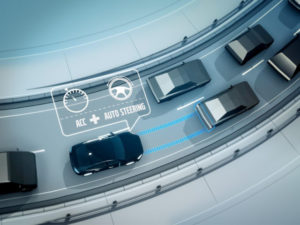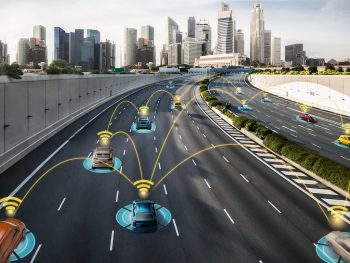King’s Speech expedites self-driving vehicles with new legislation
An Automated Vehicles Bill that will clear the way for self-driving vehicles to be used on Britain’s roads has been announced in the King’s Speech.

The new Bill will create a UK market of up to £42bn and 38,000 skilled jobs by 2035, according to the Government
One of 21 bills announced by King Charles in his first-ever opening address of Parliament as monarch, the long-awaited legislation will allow autonomous vehicles to operate without safety drivers on roads for the first time across Britain.
Charles said: “My ministers will introduce new legal frameworks to support the safe commercial development of emerging industries, such as self-driving vehicles.”
The King’s Speech sets out the Government’s policies and the proposed legislative programme for the new Parliamentary session – and the new Automated Vehicles Bill was one of just three transport-focused frameworks, alongside the draft Rail Reform Bill and new legislation that will “deal with the scourge of unlicensed pedicabs in London”.
The Government said the Automated Vehicles Bill would “unlock a transport revolution by enabling the safe deployment of self-driving vehicles. It will cement the UK’s position as a global leader in this high tech and high growth industry and deliver one of the world’s most comprehensive legal frameworks for self-driving vehicles, with safety at its core.”
The news comes just a week after the UK automotive sector said the rollout of self-driving technology in the UK could deliver a £66bn annual economic uplift by 2040 but added that swift action was needed on legislation to ensure the opportunity wasn’t lost. Potential uses of such technology include commercial applications such as self-driving cars and logistics vehicles as well as automated buses, taxis, shuttles and even tractors.
According to the Government, the new Bill will release the huge growth potential of the self-driving vehicles sector, creating a UK market of up to £42bn and creating 38,000 skilled jobs by 2035.
With 88% of accidents currently involving human error, it reckons the potential for automated vehicles to reduce costs, injuries and fatalities is “enormous”.
Many stakeholders in the automotive sector agree, including the Transport Committee, which greeted the announcement on the legislation.
Iain Stewart MP, chair of the select committee, said: “I applaud the Government’s promise of bringing forward legislation on self-driving vehicles that will help the UK to realise its place as a world leader in developing these technologies – a view shared with us from a range of voices in the transport sector. But we also urge the Government and industry to ensure passengers with accessibility needs are not left as an afterthought when these technologies are applied to public transport, as is far too often the case.”
And Axa UK, which has been working closely with the Government for the past decade on self-driving technology and has been involved in five automated vehicle trials, also welcomed the commitment. It says self-driving technology offers multiple benefits for the UK economy, road safety and green jobs.
Tara Foley, CEO of Axa UK&I, said: “As a large motor insurer, we have long been calling for this legislation to improve road safety. Introducing a regulatory framework for self-driving has huge potential to save lives. Research shows that 88% of road collisions involve an element of human error which would be eliminated with self-driving vehicles. In addition, huge savings could be made on medical and ambulance services related to road crashes that cost the NHS £2.3bn last year. Axa looks forward to working with Government to ensure that safety is at the heart of the new legislation.
“There are also benefits for the wider economy. It’s estimated that the self-driving industry will be worth £42bn and create 50,000 highly skilled jobs by 2035, and a legislative framework opens up opportunities for businesses to capitalise on this. For insurers, it also provides crucial clarity for establishing liability for self-driving.”
However, Edmund King, AA president, was more cautious.
He commented: “The plans to introduce self-driving vehicles provide the opportunity for more efficient travel, but safety must be paramount when rolled out onto UK roads. Vehicle technology to improve road safety can be designed into cars more quickly, reducing the likelihood of crashes, the workload of the emergency services, and avoidable casualties.”
And RAC head of policy Simon Williams said: “While the concept of truly driverless vehicles being commonplace on our roads might still a little sci-fi to the average driver, there is no doubting the need for this Bill. The technology is moving at pace and it’s vital the UK isn’t left behind.
“However, if we’re ever to truly realise the benefits of autonomous technology we have to sort out the state of our roads once and for all. It’s hard to fathom how driverless cars will be able to safely navigate our streets when so many road markings are faded, and then there’s the prospect of vehicles getting needlessly damaged by the UK’s pothole plague as they surely won’t be programmed to avoid them.”
What does the Bill do?

Only vehicles that can drive themselves safely and can follow all road traffic rules without the need for a human to monitor or control the vehicle will be classed as self-driving
The Government said the new legislation would be one of the world’s most comprehensive legal frameworks for self-driving vehicles, based on the recommendations set out in a four-year review by the Law Commission of England and Wales and the Scottish Law Commission.
It added that the Bill will provide the certainty and confidence that the private sector needs to unlock research, innovation and investment across the whole of the UK.
The briefing notes also state that the Automated Vehicles Bill will put safety and the protection of the user at the heart of the new regime and make sure that only the driver – be it the vehicle or person – is accountable, clarifying and updating the law.
A “rigorous” safety framework for self-driving vehicles will set the threshold for self-driving vehicles in law. Only vehicles that can drive themselves safely and can follow all road traffic rules without the need for a human to monitor or control the vehicle to maintain that level of safety will be classified as self-driving and allowed on our roads. The Department for Transport and its agencies will be given new powers to authorise these vehicles and ensure in-use compliance with the safety standards that the Government will set.
The framework will also hold companies firmly accountable once vehicles are on roads. Companies will have to meet safety requirements from the point a vehicle is introduced onto our roads or face new sanctions and penalties if they fail in their duty. These include fines, requirements to take corrective action, and suspension of operation. Criminal offences will apply in serious cases.
The Bill sets out new processes to investigate incidents involving self-driving vehicles to ensure that lessons are fed back into the safety framework.
It also includes provision to digitalise Traffic Regulation Orders (TROs). Local authorities will be required to send the legal orders they make (for example, to set speed limits, close roads and designate parking bays) to a central publication platform. This data will be used to create a digital map of the road network to support the safe operation of self-driving vehicles. This will also help make parking easier for all drivers, providing better information like the location and availability of parking spaces, as outlined in the recently published Plan for Drivers.
The rules will also ensure clear legal liability, including creating new organisations responsible for self-driving. While the vehicle is driving itself, a company rather than an individual will be responsible for the way it drives. The Bill sets out the responsibilities of companies that develop and operate self-driving vehicles on roads in Great Britain. Once authorised, companies will have ongoing obligations to keep their vehicles safe and ensure that they continue to drive in accordance with British laws. They will be required to report certain safety-related data to the authorisation authority and the in-use regulator and to comply with other relevant laws, including data protection and environmental protection legislation.
The Bill will also give users immunity from prosecution when a self-driving vehicle is driving itself, as recommended by the Law Commissions. Non-driving responsibilities however will still remain with that person, such as maintaining appropriate insurance for the vehicle and ensuring proper loading, as well as responsibility during any part of the journey where the person is driving.
Other areas include work to clamp down on misleading marketing. Only vehicles that meet the safety threshold can be marketed as self-driving. For all other vehicles, the driver is responsible at all times. And anyone using a self-driving vehicle will need to be clear about their legal responsibilities.
Philippe Colpron, head of global technology firm ZF Aftermarket, said: “Though the ambition of having a widespread adoption is exciting, it’s vital to acknowledge that the transition to autonomous mobility won’t occur overnight as it will require, beyond technology readiness, a full eco-system of services. It is good to see the Government starting to plan ahead. One crucial challenge which we should ensure not to overlook is the importance of predictive and connected maintenance solutions for the autonomous vehicles. While they promise advancements in safety, efficiency and convenience, their success is intricately linked to diligent and preventive maintenance solutions. There are currently over 42,000 repair and maintenance businesses across the UK and we must ensure to bring them along, for example through training and workshop technology, so they can continue servicing the vehicles of today and tomorrow.”
And insurer Allianz Personal said it was essential that the right legislation is in place to ensure the technology’s successful and safe adoption.
Alexandra Wyard, underwriting director, commented: “It’s vital the legislation addresses data access. Swift delivery of unbiased information following an incident is crucial to insurers, law enforcement and the road users they work on behalf of. We believe this should be held independently and made available to relevant parties where appropriate. Ultimately, how data is accessed and used needs to be open and transparent, and drivers need to feel confident with how their data is being managed.
“Given the significant changes ahead with the introduction of automated vehicles on the UK’s roads, it is essential that there is a joined-up and collaborative approach across all levels of government and the different sectors involved.”
Failure to include e-scooter laws in King’s Speech

CoMoUK says the Government is falling behind the rest of the world with its lack of action on e-scooters and other powered micro vehicles
In separate news, national shared transport charity Collaborative Mobility UK (CoMoUK) has criticised the Government for failing to bring forward plans to legalise the safer and responsible use of e-scooters in the King’s Speech.
The Government previously promised to introduce a new regulatory framework through a Transport Bill in last year’s Queen’s Speech but it is yet to act.
Rental e-scooters are currently only available through government trials in about 23 towns and cities across England, and it is illegal to use private e-scooters on public roads.
These trials are set to end in May next year, and an estimated 750,000 privately owned, unregulated e-scooters are in use.
CoMoUK says the Government is falling behind the rest of the world with its lack of action on e-scooters and other powered micro vehicles.
It’s now urged ministers to extend the e-scooter trials until legislation is introduced.
Richard Dilks, chief executive of the transport charity, said: “Legalising and regulating e-scooters will not only help reduce emissions and promote sustainable transport but also provide a convenient and affordable transport option for many struggling with the cost-of-living crisis.
“We must not fall further behind as the world adopts this new mode of transport. The time to act is now.”















